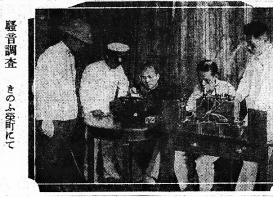This project investigates the transfer of noise monitoring technologies from New York City to Taipei vis-à-vis Japanese colonial administrators in the 1930s. It highlights the transnational relationship between localized listening practices, colonial governance, and aspirations of Western modernity. Drawing upon colonial reports on noise monitoring from the Office of the Governor-General and social commentary on street noise by Japanese settlers, this project provides an account of the constitutive relationship between urban environmental noise and technologically-mediated perceptions of noise.
In comparison to public health and safety concerns around food shortages, heat-related illnesses, and the threat of rebel uprisings, urban street noise may have seemed tangential to other problems confronting Japanese colonial officials in the early 1900s in Taiwan. As a technological puzzle, however, city noise provided a new opportunity for the testing and implementation of Western technologies and administrative sciences. Instead of a pre-existing, cultural understanding of noise as unwanted sound, noise in Taiwan was produced as a problem through a set of technological devices, including the audiometer, which informed the way colonial administrators introduced noise abatement as part of the civilizing project in Taiwan. Noise monitoring was included within the discourses of public health and administrative governance, wherein technology became an epistemic tool for practical knowledge about noise.
This project analyzes noise abatement and acoustical sciences within the context of East Asian modernities and draws attention to multiple intervening processes of translation from the West—first to imperial Japan and then onto colonial Taiwan. Furthermore, by attending to the production of acoustical knowledge in a colonial context, this project provides a historical linkage to ethnographic findings in my doctoral dissertation concerning the technoscientific legacy of noise in present-day Taiwan.

